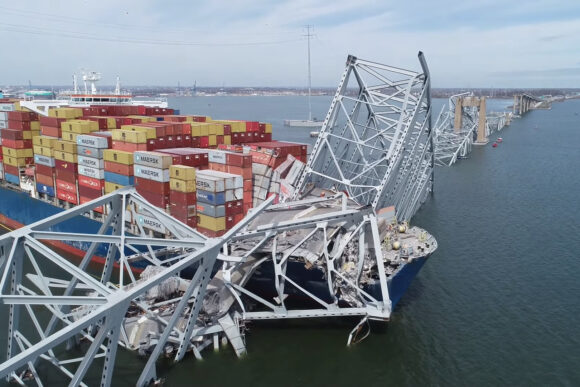The manager of the cargo ship that caused the collapse of Baltimore’s Key Bridge in March 2024 should be denied the protections of a federal maritime law it seeks to invoke because it is not the owner of the ship, the state of Maryland says.
The state attorney general and attorneys for wrongful death claimants have asked a federal court to dismiss the petition by Synergy Marine for the benefits of the Limitation of Liability Act because, they argue, the law applies only to actual owners of vessels. Grace Ocean Private Limited was and is the owner of the cargo ship Dali, while Synergy was the manager and thus not eligible under the law, the lawyers maintain.
The legal filing seeks dismissal of Synergy’s petition only; it does not address Grace Ocean’s petition for protection under the act to limit its liability.
According to the filing, Synergy was not an owner because there was never a “complete transfer of possession, command, and navigation of the vessel” by owner Grace Ocean to Synergy, and those “are the characteristics that distinguish an owner.”
The filing contends that Synergy was not responsible for the vessel’s navigation, did not employ the crew, was subject to daily oversight by the owner, has no financial responsibility for the vessel’s operation, has no financial exposure for claims and does not provide insurance for the vessel.
“Synergy Marine played a key role in the disaster that unfolded at the Francis Scott Key Bridge, but its role was not that of an owner,” the filing states. Therefore, Synergy Marine lacks standing under the Limitation Act and its petition for limitation should be dismissed, the filing advises the court.
The Limitation of Liability Act in some cases limits the liability of ship owners if they were not aware that the vessel causing the loss was in unseaworthy condition. The act covers personal injury losses such as deaths and collisions, as well as losses of property, goods, or merchandise.
Grace Ocean and Synergy have claimed that the collapse of the bridge was “not due to any fault, neglect, or want of care” on their part or on the part of the vessel or any parties for whose acts they may be responsible.
Grace Ocean and Synergy maintain that they shouldn’t be held liable for any loss or damage from the disaster. But if they are held liable, their liability should be limited under the maritime law to no more than the value of the ship and its cargo after the crash, or $43.7 million. Before the crash, the value of the ship was about $90 million.
While at this point the plaintiffs are only asking the court to dismiss the bid by Synergy to invoke the limit on liability, they want the court to hold both Grace Ocean and Synergy fully accountable for alleged negligence, mismanagement, and incompetence.
The state and other claimants maintain that the disaster was preventable. They believe that the ship’s owner and operator failed to correct power failures prior to leaving its berth and neglected to report them to the pilots before departing the port. In addition, the. ship’s electrical equipment failed because management “intentionally circumvented critical safety features,” according to the state’s complaint. The state has also alleged that the companies failed to properly train the crew to handle this type of emergency.
In the early morning hours of March 26, the Dali crashed into the bridge, causing its catastrophic collapse, the death of six men, and injuries to others. The wreckage from the bridge fell into the Patapsco River, blocked access to most of the Port of Baltimore, and caused disruptions and “other significant harms to the state and its residents that will be felt for decades to come,” the state has claimed.
Photo: Collapsed Francis Scott Key Bridge in Maryland with Cargo Ship Dali. NTSB photo.
Was this article valuable?
Here are more articles you may enjoy.



 Viewpoint: How P/C Carriers Can Win the Next Decade With Tech + Talent
Viewpoint: How P/C Carriers Can Win the Next Decade With Tech + Talent  Lemonade Books Q4 Net Loss of $21.7M as Customer Count Grows
Lemonade Books Q4 Net Loss of $21.7M as Customer Count Grows  Florida Regulators Crack the Whip on Auto Warranty Firm, Fake Certificates of Insurance
Florida Regulators Crack the Whip on Auto Warranty Firm, Fake Certificates of Insurance  Judge Tosses Buffalo Wild Wings Lawsuit That Has ‘No Meat on Its Bones’
Judge Tosses Buffalo Wild Wings Lawsuit That Has ‘No Meat on Its Bones’ 

